TBM offers pure water and Living Water to Sierra Leone
SIERRA LEONE—Hundreds of people in two villages in Sierra Leone gained access to clean water, and at least 75 accepted the gift of Living Water, thanks to three Texas Baptist Men volunteers.
Dee Dee and Tim Wint from The Village Church in Flower Mound and Billy Joe Wall, pastor of Avenue Baptist Church in Hereford, spent two weeks drilling and installing wells and conducting health and hygiene classes, working in cooperation with the Konoyima Educational Fund.
Devastated by civil war and Ebola
The TBM volunteers worked in the Kono District, the easternmost province in Sierra Leone—a region known for its diamond mines but devastated by 11 years of civil war, followed by an Ebola outbreak.
“Schools and churches were closed more than 11 years, and a whole generation of schoolchildren was left without education,” said Dee Dee Wint, vice president of the TBM Water Ministry. “They are behind economically and educationally.”
More than 70 percent of the people live below the poverty line. About half the men and three-fourths of the women are illiterate.
Providing access to pure water
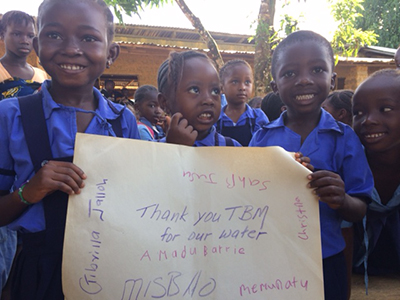 Children in Sierra Leone express appreciation to Texas Baptist Men for the gift of clean water.The Konoyima Educational Fund has started Christian schools and churches throughout the district, but many are in areas that lack clean water, Wint said. The Kono District is experiencing an 80 percent infant morality rate due to water-borne diseases.
Children in Sierra Leone express appreciation to Texas Baptist Men for the gift of clean water.The Konoyima Educational Fund has started Christian schools and churches throughout the district, but many are in areas that lack clean water, Wint said. The Kono District is experiencing an 80 percent infant morality rate due to water-borne diseases.
“We worked in two villages, and neither had a clean water source,” she said. “The people were either walking long distances to fill containers from a hand-dug exposed well or from a river that is downstream from the mines.”
The TBM team drilled wells in each of the villages at least 40 feet deep, tapping into an aquifer far below the polluted groundwater seepage, she explained.
Global missions rookie but experienced well driller
The trip to Sierra Leone marked Wall’s first overseas experience with the TBM water ministry, but he brought more than three decades of experience as a water-well driller to the mission field.
“I started working as a kid in my family’s water-well-drilling business,” Wall said. “It’s a blessing to be able to use the gifts God put in my life over the years.”
Wall left the well-drilling business to work several years as a Baptist camp manager before he accepted his first pastorate at age 63.
“That’s kind of old to be starting out as a pastor. I’ve learned you don’t question the Lord. You just do whatever he calls you to do,” he said.
‘The Lord was already there’
In addition to applying his well-drilling expertise in Sierra Leone, Wall also preached in two Sunday worship services.
“I wanted to share the love of the Lord with the people, but when we got there, the people were already singing and praising him,” he recalled. “The Lord was already there. We just got to be a part of what the Lord was doing.”
Teaching health and hygiene
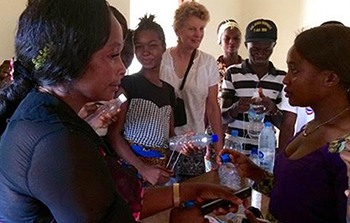 Dee Dee Wint (center) teaches health and hygiene in Sierra Leone.In addition to installing wells, the TBM volunteers also led health and hygiene classes. Dee Dee Wint trained 27 church leaders, who in turn led classes in two villages.
Dee Dee Wint (center) teaches health and hygiene in Sierra Leone.In addition to installing wells, the TBM volunteers also led health and hygiene classes. Dee Dee Wint trained 27 church leaders, who in turn led classes in two villages.
Among other lessons, participants learned how to make “tippy taps”—a portable hand washing station constructed from plastic bottles.
“We emphasized the importance of hand washing with soap and running water, as it can reduce diarrheal disease-associated deaths by up to 50 percent,” she said.
At one of the health and hygiene classes led in a community center by church leaders, 209 people attended, and 75 made professions of faith in Christ, including seven women from Muslim homes.
Ministry among Muslims
The volunteers also presented the gospel at dedication ceremonies for the wells—one of them installed next to a church and Christian school built on land donated by a Muslim leader.
“At the dedication, we told the people we were giving the well to Jesus and the community. We made it clear the well is open to everybody—not just the students who attend the Christian school,” Dee Dee Wint said.
A Muslim imam attended the dedication to express gratitude, and children sang thank-you songs, she added.
In spite of the crippling poverty in the region, Wall noted the generosity and kindness of the people he encountered—Muslim and Christian alike.
“The Lord opened my heart up to the people,” he said. “I’m ready to go again. It’s a privilege not only to bring water to people, but also Living Water and the Spirit. That’s what it’s all about.”





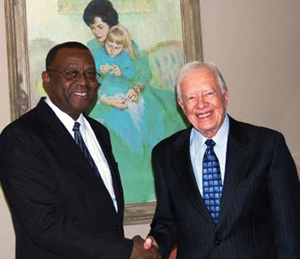

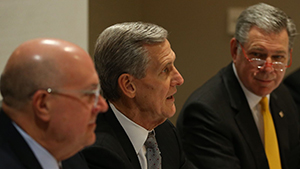
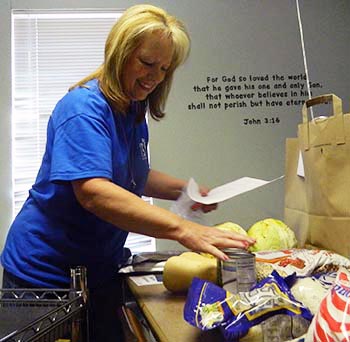
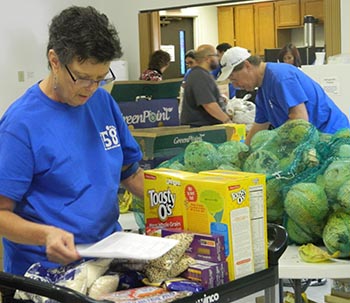
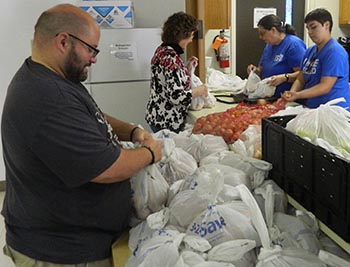

 “This record is a little different from the first one. On the first record, almost all the songs were older hymns, and it was a little bit of a simpler production. This record is a mixture of half old songs and half new songs. It was a great joy to do work on a hymns project again, and I couldn’t be happier with the way the album turned out.
“This record is a little different from the first one. On the first record, almost all the songs were older hymns, and it was a little bit of a simpler production. This record is a mixture of half old songs and half new songs. It was a great joy to do work on a hymns project again, and I couldn’t be happier with the way the album turned out. In December, Smith will help promote and support Operation Christmas Child while touring and performing festive holiday songs and traditional carols with a full symphony orchestra alongside fellow Grammy Award-winning recording artist Amy Grant and special guest Jordan Smith, season nine winner of NBC’s reality singing competition The Voice. They will perform alongside the Plano Symphony Orchestra Dec. 2 at Verizon Theatre in Grand Prairie.
In December, Smith will help promote and support Operation Christmas Child while touring and performing festive holiday songs and traditional carols with a full symphony orchestra alongside fellow Grammy Award-winning recording artist Amy Grant and special guest Jordan Smith, season nine winner of NBC’s reality singing competition The Voice. They will perform alongside the Plano Symphony Orchestra Dec. 2 at Verizon Theatre in Grand Prairie.